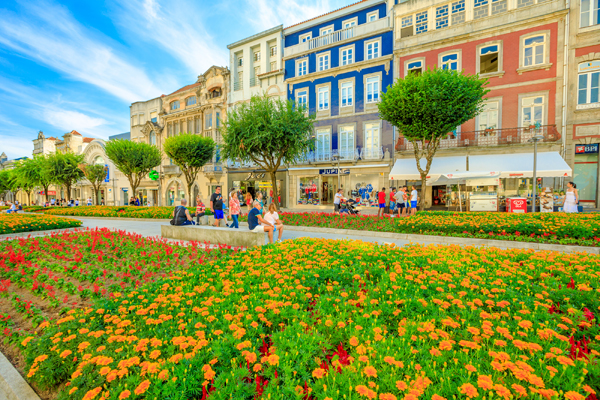Retire in Braga Guide
Summary: If Braga is on your retirement radar, our detailed Retire in Braga Guide is your go-to resource. Delve into the crucial aspects of life here, including living costs, climate, housing options, healthcare services, and residency procedures. We also explore the city's social dynamics, volunteering scenes, transportation, and how walkable its neighborhoods are.

Braga is a popular destination for international retirees due to its rich history, beautiful architecture, and warm, welcoming community. The city offers a high quality of life with a low cost of living, making it an attractive option for those looking to stretch their retirement savings. However, like any foreign country, there are challenges to consider, such as language barriers and understanding the local customs and laws.
Cost of Living in Braga
The cost of living in Braga is significantly lower than in many other European cities. Rent for a one-bedroom apartment in the city center averages around €500 per month, while utilities and groceries are also reasonably priced. Eating out at local restaurants is affordable, with a meal at a mid-range restaurant costing around €15. This allows retirees to enjoy a comfortable lifestyle without breaking the bank.
Climate
Braga enjoys a Mediterranean climate, with hot, dry summers and mild, wet winters. The average temperature in the summer months is around 25°C (77°F), while in winter it drops to around 10°C (50°F). This pleasant climate allows retirees to enjoy outdoor activities year-round.
Healthcare
Braga is home to several high-quality hospitals and clinics, including the Hospital de Braga, which is one of the most modern and well-equipped in the country. Many doctors and medical staff speak English, making it easier for international retirees to communicate their health needs.
Public Healthcare System
Portugal has a public healthcare system that is free at the point of use for residents. International retirees can enroll in the system, although many choose to take out private health insurance for additional coverage. The quality of care is generally high, although waiting times can be longer than in private healthcare.
Residency Options for Retirees
Portugal offers a range of residency options for retirees, including the Non-Habitual Resident (NHR) scheme, which offers tax benefits for a period of ten years. There is also the Golden Visa program, which offers residency in return for an investment in the country.
Parks and Recreational Activities
Braga is home to several beautiful parks, including the Santa Barbara Garden and the Bom Jesus do Monte, which offer stunning views of the city. There are also numerous cultural attractions, such as the Braga Cathedral and the Roman ruins at Citania de Briteiros.
Restaurants
There are many excellent restaurants in Braga, offering a range of cuisines. Some popular options include Restaurante Centurium, known for its traditional Portuguese dishes, and Taberna Belga, which serves Belgian-style fries and a variety of beers.
Learning the Language
While many locals in Braga speak English, learning Portuguese can enhance your experience. The University of Minho offers Portuguese language courses for foreigners, providing a great opportunity to learn the language and meet new people.
Local Culture
The locals in Braga are known for their friendliness and hospitality. The city has a relaxed pace of life, with a strong focus on family and community. There are also numerous festivals and events throughout the year, providing plenty of opportunities to engage with the local culture.
Meeting People and Volunteering
There are many ways for retirees to meet people in Braga, from joining local clubs and societies to volunteering. The city has a vibrant expat community, with regular meetups and events. Volunteering opportunities are also plentiful, with organizations such as the Red Cross and local animal shelters always in need of help.
Housing Options
Most retirees in Braga choose to live in apartments in the city center, where they can be close to amenities and public transportation. However, there are also options for those who prefer a quieter lifestyle, with many beautiful villas and houses available in the surrounding countryside.
Transportation
Braga has an excellent public transportation system, with regular bus and train services. The city is also very walkable, with many amenities within easy reach. While having a car can be useful for exploring the wider region, it is not necessary for day-to-day life in the city.
About the Author
 Betsy Burlingame is the Founder and President of Expat Exchange and is one of the Founders of Digital Nomad Exchange. She launched Expat Exchange in 1997 as her Master's thesis project at NYU. Prior to Expat Exchange, Betsy worked at AT&T in International
and Mass Market Marketing. She graduated from Ohio Wesleyan University
with a BA in International Business and German.
Betsy Burlingame is the Founder and President of Expat Exchange and is one of the Founders of Digital Nomad Exchange. She launched Expat Exchange in 1997 as her Master's thesis project at NYU. Prior to Expat Exchange, Betsy worked at AT&T in International
and Mass Market Marketing. She graduated from Ohio Wesleyan University
with a BA in International Business and German.
Some of Betsy's articles include 12 Best Places to Live in Portugal, 7 Best Places to Live in Panama and 12 Things to Know Before Moving to the Dominican Republic. Betsy loves to travel and spend time with her family. Connect with Betsy on LinkedIn.
Additional Information:
- Pros & Cons of Living in Braga
- Driving in Braga
- Health Care in Braga
- The Essential Guide to Braga
- Cost of Living in Braga
- Healthcare & Health Insurance in Portugal
- Best Places to Live in Portugal
- Real Estate in Portugal
- Italy vs. Portugal
- Pros and Cons of Living in Portugal 2025
- 2025 Guide to Moving to Portugal
- More Advice about Retiring in Portugal




